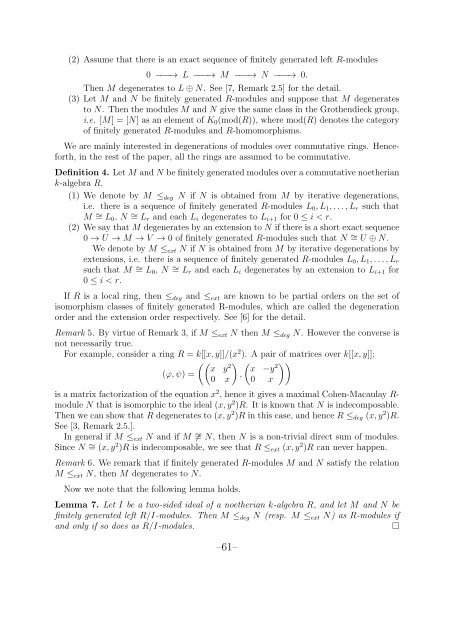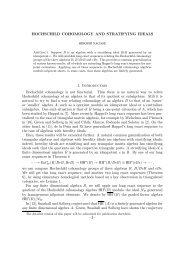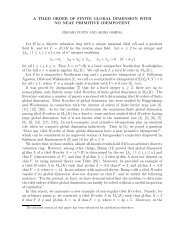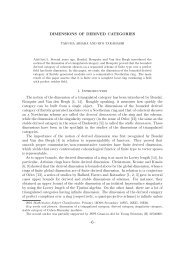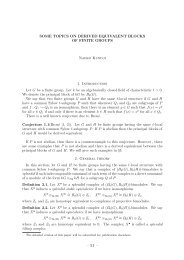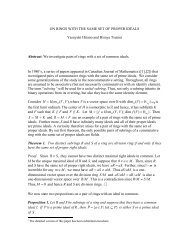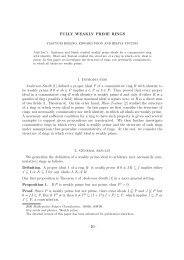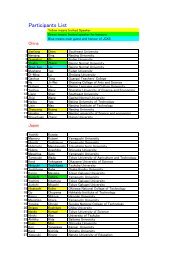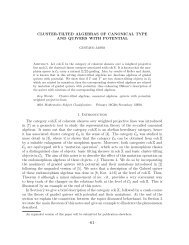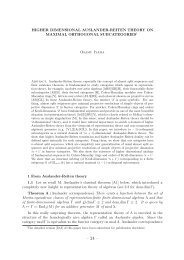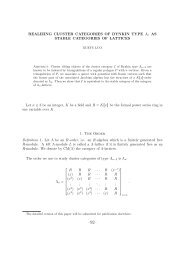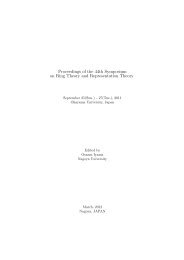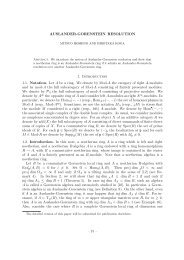Proceedings of the 44th Symposium on Ring Theory and ...
Proceedings of the 44th Symposium on Ring Theory and ...
Proceedings of the 44th Symposium on Ring Theory and ...
Create successful ePaper yourself
Turn your PDF publications into a flip-book with our unique Google optimized e-Paper software.
(2) Assume that <str<strong>on</strong>g>the</str<strong>on</strong>g>re is an exact sequence <str<strong>on</strong>g>of</str<strong>on</strong>g> finitely generated left R-modules<br />
0 −−−→ L −−−→ M −−−→ N −−−→ 0.<br />
Then M degenerates to L ⊕ N. See [7, Remark 2.5] for <str<strong>on</strong>g>the</str<strong>on</strong>g> detail.<br />
(3) Let M <strong>and</strong> N be finitely generated R-modules <strong>and</strong> suppose that M degenerates<br />
to N. Then <str<strong>on</strong>g>the</str<strong>on</strong>g> modules M <strong>and</strong> N give <str<strong>on</strong>g>the</str<strong>on</strong>g> same class in <str<strong>on</strong>g>the</str<strong>on</strong>g> Gro<str<strong>on</strong>g>the</str<strong>on</strong>g>ndieck group,<br />
i.e. [M] = [N] as an element <str<strong>on</strong>g>of</str<strong>on</strong>g> K 0 (mod(R)), where mod(R) denotes <str<strong>on</strong>g>the</str<strong>on</strong>g> category<br />
<str<strong>on</strong>g>of</str<strong>on</strong>g> finitely generated R-modules <strong>and</strong> R-homomorphisms.<br />
We are mainly interested in degenerati<strong>on</strong>s <str<strong>on</strong>g>of</str<strong>on</strong>g> modules over commutative rings. Henceforth,<br />
in <str<strong>on</strong>g>the</str<strong>on</strong>g> rest <str<strong>on</strong>g>of</str<strong>on</strong>g> <str<strong>on</strong>g>the</str<strong>on</strong>g> paper, all <str<strong>on</strong>g>the</str<strong>on</strong>g> rings are assumed to be commutative.<br />
Definiti<strong>on</strong> 4. Let M <strong>and</strong> N be finitely generated modules over a commutative noe<str<strong>on</strong>g>the</str<strong>on</strong>g>rian<br />
k-algebra R.<br />
(1) We denote by M ≤ deg N if N is obtained from M by iterative degenerati<strong>on</strong>s,<br />
i.e. <str<strong>on</strong>g>the</str<strong>on</strong>g>re is a sequence <str<strong>on</strong>g>of</str<strong>on</strong>g> finitely generated R-modules L 0 , L 1 , . . . , L r such that<br />
M ∼ = L 0 , N ∼ = L r <strong>and</strong> each L i degenerates to L i+1 for 0 ≤ i < r.<br />
(2) We say that M degenerates by an extensi<strong>on</strong> to N if <str<strong>on</strong>g>the</str<strong>on</strong>g>re is a short exact sequence<br />
0 → U → M → V → 0 <str<strong>on</strong>g>of</str<strong>on</strong>g> finitely generated R-modules such that N ∼ = U ⊕ N.<br />
We denote by M ≤ ext N if N is obtained from M by iterative degenerati<strong>on</strong>s by<br />
extensi<strong>on</strong>s, i.e. <str<strong>on</strong>g>the</str<strong>on</strong>g>re is a sequence <str<strong>on</strong>g>of</str<strong>on</strong>g> finitely generated R-modules L 0 , L 1 , . . . , L r<br />
such that M ∼ = L 0 , N ∼ = L r <strong>and</strong> each L i degenerates by an extensi<strong>on</strong> to L i+1 for<br />
0 ≤ i < r.<br />
If R is a local ring, <str<strong>on</strong>g>the</str<strong>on</strong>g>n ≤ deg <strong>and</strong> ≤ ext are known to be partial orders <strong>on</strong> <str<strong>on</strong>g>the</str<strong>on</strong>g> set <str<strong>on</strong>g>of</str<strong>on</strong>g><br />
isomorphism classes <str<strong>on</strong>g>of</str<strong>on</strong>g> finitely generated R-modules, which are called <str<strong>on</strong>g>the</str<strong>on</strong>g> degenerati<strong>on</strong><br />
order <strong>and</strong> <str<strong>on</strong>g>the</str<strong>on</strong>g> extensi<strong>on</strong> order respectively. See [6] for <str<strong>on</strong>g>the</str<strong>on</strong>g> detail.<br />
Remark 5. By virtue <str<strong>on</strong>g>of</str<strong>on</strong>g> Remark 3, if M ≤ ext N <str<strong>on</strong>g>the</str<strong>on</strong>g>n M ≤ deg N. However <str<strong>on</strong>g>the</str<strong>on</strong>g> c<strong>on</strong>verse is<br />
not necessarily true.<br />
For example, c<strong>on</strong>sider a ring R = k[[x, y]]/(x 2 ). A pair <str<strong>on</strong>g>of</str<strong>on</strong>g> matrices over k[[x, y]];<br />
(( ) ( ))<br />
x y<br />
2 x −y<br />
2<br />
(ϕ, ψ) = ,<br />
0 x 0 x<br />
is a matrix factorizati<strong>on</strong> <str<strong>on</strong>g>of</str<strong>on</strong>g> <str<strong>on</strong>g>the</str<strong>on</strong>g> equati<strong>on</strong> x 2 , hence it gives a maximal Cohen-Macaulay R-<br />
module N that is isomorphic to <str<strong>on</strong>g>the</str<strong>on</strong>g> ideal (x, y 2 )R. It is known that N is indecomposable.<br />
Then we can show that R degenerates to (x, y 2 )R in this case, <strong>and</strong> hence R ≤ deg (x, y 2 )R.<br />
See [3, Remark 2.5.].<br />
In general if M ≤ ext N <strong>and</strong> if M ≁ = N, <str<strong>on</strong>g>the</str<strong>on</strong>g>n N is a n<strong>on</strong>-trivial direct sum <str<strong>on</strong>g>of</str<strong>on</strong>g> modules.<br />
Since N ∼ = (x, y 2 )R is indecomposable, we see that R ≤ ext (x, y 2 )R can never happen.<br />
Remark 6. We remark that if finitely generated R-modules M <strong>and</strong> N satisfy <str<strong>on</strong>g>the</str<strong>on</strong>g> relati<strong>on</strong><br />
M ≤ ext N, <str<strong>on</strong>g>the</str<strong>on</strong>g>n M degenerates to N.<br />
Now we note that <str<strong>on</strong>g>the</str<strong>on</strong>g> following lemma holds.<br />
Lemma 7. Let I be a two-sided ideal <str<strong>on</strong>g>of</str<strong>on</strong>g> a noe<str<strong>on</strong>g>the</str<strong>on</strong>g>rian k-algebra R, <strong>and</strong> let M <strong>and</strong> N be<br />
finitely generated left R/I-modules. Then M ≤ deg N (resp. M ≤ ext N) as R-modules if<br />
<strong>and</strong> <strong>on</strong>ly if so does as R/I-modules.<br />
□<br />
–61–


